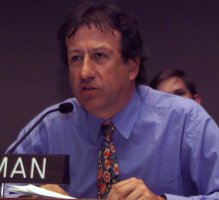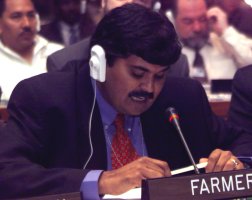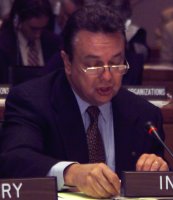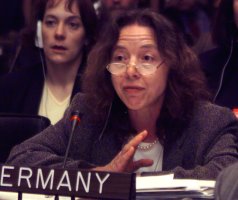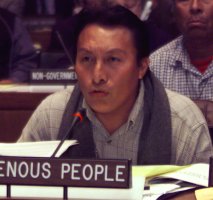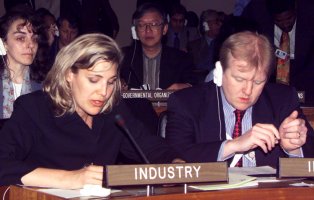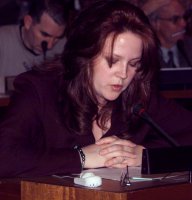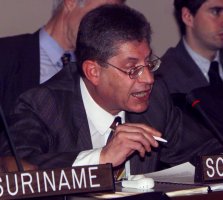 |
|
Multi-stakeholder Dialogue Segment on Knowledge
for a sustainable food system: identifying and providing for education,
training, knowledge shoaring and information needs
|
|
|
 Ajaz
Vashee, President,
Zambia National Farmers' Union
spoke
on behalf of Farmers underscoring
that generations of knowledge are contained in agricultural
biodiversity, and that training methods should respect and seek
only to enrich local knowledge. The exchange of information among
farmers, rural extension initiatives, public-sector research and
participatory processes were all encouraged. Vashee went on to
encourage recognition through publication of this combined
knowledge by organizations such as UNESCO, and targeted funding by
organizations such as the World Bank.
Ajaz
Vashee, President,
Zambia National Farmers' Union
spoke
on behalf of Farmers underscoring
that generations of knowledge are contained in agricultural
biodiversity, and that training methods should respect and seek
only to enrich local knowledge. The exchange of information among
farmers, rural extension initiatives, public-sector research and
participatory processes were all encouraged. Vashee went on to
encourage recognition through publication of this combined
knowledge by organizations such as UNESCO, and targeted funding by
organizations such as the World Bank.
|

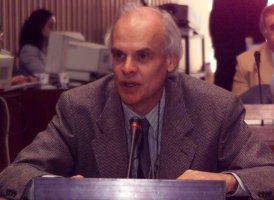 Peter
Hurst, Health, Safety and
Environment Co-ordinator of the IUF (the
Internatoinal Union of Food, Agricultural, Hotel, Restaurant,
Catering, Tobacco and Allied Workers' Associations) represented Trade
Unions and stated that agricultural workers in waged
employment tended to be the poorest, least organized, least
literate, and most oppressed workers. Conversely, as a skilled
workforce with generations of knowledge in crop growth, farm
operation, and agriculture, their knowledge remained largely
ignored, unrecognized, untapped, and as peoples, they remained
socio-economically marginalized, with collective bargaining and
basic human rights absent, and invisible in Agenda 21. Trade
Unions thus advised education, training on sustainable agriculture
and organic systems, employment standards, and expansion in
cooperative efforts with all stakeholders. Peter
Hurst, Health, Safety and
Environment Co-ordinator of the IUF (the
Internatoinal Union of Food, Agricultural, Hotel, Restaurant,
Catering, Tobacco and Allied Workers' Associations) represented Trade
Unions and stated that agricultural workers in waged
employment tended to be the poorest, least organized, least
literate, and most oppressed workers. Conversely, as a skilled
workforce with generations of knowledge in crop growth, farm
operation, and agriculture, their knowledge remained largely
ignored, unrecognized, untapped, and as peoples, they remained
socio-economically marginalized, with collective bargaining and
basic human rights absent, and invisible in Agenda 21. Trade
Unions thus advised education, training on sustainable agriculture
and organic systems, employment standards, and expansion in
cooperative efforts with all stakeholders.
|
 |
 Maria
Jose Guazzelli, Centro
Ecologico (Brazil) noted
on behalf of NGOs that small farmers and workers
comprise the vast majority of food producers, and they have not
had a place at the decision making table. She refocused attention
on food, not just as a commodity, but as our most direct link with
the natural world, and suggested that the knowledge and work
behind its production be highly valued and represented in Agenda
21. Efforts need to be strengthened in the dissemination of
knowledge, to recognize small farmers in research, to encourage
farmer-to-farmer exchange, to undertake action-research in the
field, promote training programs.
Maria
Jose Guazzelli, Centro
Ecologico (Brazil) noted
on behalf of NGOs that small farmers and workers
comprise the vast majority of food producers, and they have not
had a place at the decision making table. She refocused attention
on food, not just as a commodity, but as our most direct link with
the natural world, and suggested that the knowledge and work
behind its production be highly valued and represented in Agenda
21. Efforts need to be strengthened in the dissemination of
knowledge, to recognize small farmers in research, to encourage
farmer-to-farmer exchange, to undertake action-research in the
field, promote training programs. |
|
 Roberto Rodriguez, Industry
Roberto Rodriguez, Industry
During the
open dialogue, he highlighted the importance of the internet as
an instrument of transition of knowledge for cooperatives and farmers.
|
|
| Open Dialogue and Recommendations |
|
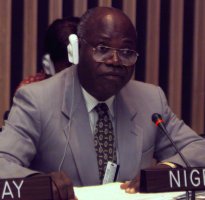
|
Nigeria,
for the G-77/China, stressed the importance of: increased stakeholder
support and government funding for agricultural training, research
and capacity-building; technology generation, adaptation and dissemination;
and the participatory approach, supported by government and the
private sector, in research and extension programmes.
|
Germany
gave a developed country perspective and identified four issues
related to sustainable agriculture: consumer education and knowledge;
the inclusion of farmers in research activities and the incorporation
of traditional knowledge into extension services; the risk of
denying access by small-scale farmers to research results due
to the current intellectual property rights (IPR) regime; and
workers' right to a living wage and safe working conditions.
|
|
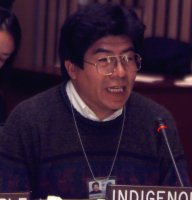 |
Moises
Gutierrez, Aymara Nation (left) and Tito Livio Martinez,
Kuna Youth Movement/International Indian Treaty Council, discussed
the importance of traditional knowledge
|
|
| The
represenatives of Indigenous People recommended: acknowledgement
of the scientific and technical knowledge of indigenous people as
a contribution to sustainable agriculture; provision of financial
resources to develop knowledge through indigenous peoples' institutions;
the continuation of stakeholder dialogue at CSD sessions; participation
of indigenous people in decision-making at the national level, including
a sustainable development clearing-house mechanism managed by indigenous
people; CSD promotion of the legal recognition of indigenous land
and territories; and adoption by the CSD of the principle of prior
informed consent and the right of indigenous people to refuse access
to their knowledge. |
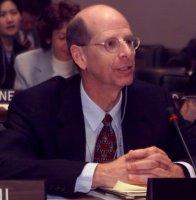 |
William
N. Witting, representing the Citizens Network, an NGO working
closely with industry (left)
Victoria
Sebageraka, Uganda National Farmers Association
|
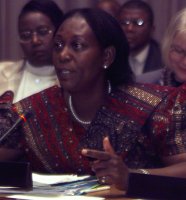 |
| Recommendations:
Industry
called for: improved budgets for agricultural research; and recognition
of the role of the internet in information dissemination, and that
of agricultural cooperatives in knowledge and technology sharing.
NGO representatives called for: professional training in indigenous
science and agro-ecology; stronger indigenous farmers' networks; recognition
that the maintenance of knowledge and biodiversity in the public domain
are key to SARD objectives; attention to issues surrounding the ownership
of knowledge; a shift in the use of resources to support sustainable
food systems; and full access to product information for consumers.
Farmers
called for: recognition that local and traditional knowledge is a
fundamental basis of scientific research; partnerships; the popular
dissemination of knowledge; farmer-to-farmer processes to encourage
innovation; a global system to make information freely available;
and support for negotiations on free access to genetic resources.
|
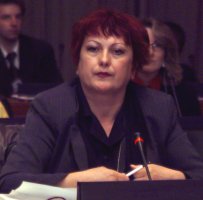 |
Jasna
A. Petrovic, Women's Network, International Confederation
of Free Trade Unions (left)
Kathy
Lawrence, Just Food
|
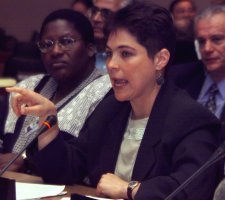 |
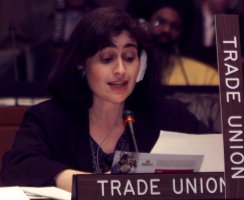 |
Sharon
Abreu, a musician and member of the Local 1000 N.A. Traveling
Musicians Union, discussed the promotion of the World Harmony
Network, and the role of the arts in education about environmental
and sustainable development issues.
|
| Recommendations: Trade
Unions recommended
that: multinational companies and governments fund education and communication
programmes; workers enjoy the right to refuse dangerous work, to have
access to information and training on pesticide use, and to collective
bargaining; and highlighted the role of the artistic community in
supporting education for sustainable development. NGOs called
for: professional training in indigenous science and agro-ecology;
stronger indigenous farmers' networks; recognition that the maintenance
of knowledge and biodiversity in the public domain are key to SARD
objectives; attention to issues surrounding the ownership of knowledge;
a shift in the use of resources to support sustainable food systems;
and full access to product information for consumers. |
| Multi-Stakeholder Dialogue on Globalization, trade
liberalization and investment patterns: economic incentives and framework
conditions to promote sustainable agriculture |
|
|
 Sarah Fogarty
of the Grocery Manufacturers of America expressed
the interests of Industry and Trade to improve the
quality of life in developing and developed countries. Key issues
included allowing alignment of food prices at world levels,
harmonizing food regulatory systems, promoting private initiatives
in land ownership, providing access to markets, the promotion of
investment in the agricultural sector.
Sarah Fogarty
of the Grocery Manufacturers of America expressed
the interests of Industry and Trade to improve the
quality of life in developing and developed countries. Key issues
included allowing alignment of food prices at world levels,
harmonizing food regulatory systems, promoting private initiatives
in land ownership, providing access to markets, the promotion of
investment in the agricultural sector.
|
|
 Mr. G.J. Doornbos
(Netherlands), President of the International Federation of
Agricultural Producers (IFAP) spoke on behalf of Farm
Producers stating the need for 6 essential elements that
comprise a framework condition for sustainable agriculture: (i) a
stabile policy environment; (ii) infrastructure development of
market systems, telecommunications, energy, healthcare, education;
(iii) appropriate regulatory frameworks to provide legal safeguards,
effective trade rules; (iv) effective stakeholder participation
incorporating democratic processes at all levels, and the
strengthening of farmer organizations; (v) agricultural development
support in terms of funding and institutional backing; and (vi)
effective mechanisms for technology transfers.
Mr. G.J. Doornbos
(Netherlands), President of the International Federation of
Agricultural Producers (IFAP) spoke on behalf of Farm
Producers stating the need for 6 essential elements that
comprise a framework condition for sustainable agriculture: (i) a
stabile policy environment; (ii) infrastructure development of
market systems, telecommunications, energy, healthcare, education;
(iii) appropriate regulatory frameworks to provide legal safeguards,
effective trade rules; (iv) effective stakeholder participation
incorporating democratic processes at all levels, and the
strengthening of farmer organizations; (v) agricultural development
support in terms of funding and institutional backing; and (vi)
effective mechanisms for technology transfers.
|
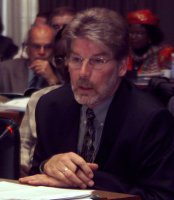 |
|
|
 Christine Taylor
(Canada) of the United Food and Commercial Workers spoke on
behalf of Trade Unions noted that in the past decade of the
most rapid economic growth and world trade has resulted in the
widening of economic gaps, falling levels of nutrition,
unsustainable production methods, and growing world debt exacerbated
by structural adjustment programs. With this, conditions for workers
are deteriorating, and change should incorporate the participation
of workers, incorporates labour standards, and calls for the
abolition of child labour. The members of the CSD were encouraged to
regulate the roles of multinational corporations that control the
food system on behalf of consumers, and to endorse the ILO health
and safety convention.
Christine Taylor
(Canada) of the United Food and Commercial Workers spoke on
behalf of Trade Unions noted that in the past decade of the
most rapid economic growth and world trade has resulted in the
widening of economic gaps, falling levels of nutrition,
unsustainable production methods, and growing world debt exacerbated
by structural adjustment programs. With this, conditions for workers
are deteriorating, and change should incorporate the participation
of workers, incorporates labour standards, and calls for the
abolition of child labour. The members of the CSD were encouraged to
regulate the roles of multinational corporations that control the
food system on behalf of consumers, and to endorse the ILO health
and safety convention. |
 Chee Yoke
Ling
of
the Third World Network spoke on behalf of NGOs, and
described globalization as a hurdle to development, trade
liberalization as a shift in control toward multinational
corporations, and economic incentives in the form of aid or
investment as a facilitator of developing country dependency.
Chee Yoke
Ling
of
the Third World Network spoke on behalf of NGOs, and
described globalization as a hurdle to development, trade
liberalization as a shift in control toward multinational
corporations, and economic incentives in the form of aid or
investment as a facilitator of developing country dependency. |
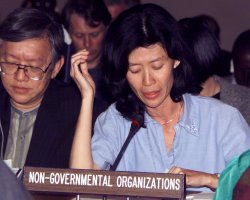 |
| Open Dialogue and Recommendations |
|
|
 Dirk C duToit, Deputy Minister
for Agriculture and Land Affairs (South Africa) gave a
developing country perspective to the dialogue. He noted that
developed countries talk of agriculture as a lifestyle, whereas
developing countries talk about agriculture as a livelihood, and
that the real killer disease in developing countries is debt
restructuring. Key ingredients in the strategy he outlined included
advocating the analysis and integration of social and environmental
effects into decision-making, and pursuing the precautionary
principle.
Dirk C duToit, Deputy Minister
for Agriculture and Land Affairs (South Africa) gave a
developing country perspective to the dialogue. He noted that
developed countries talk of agriculture as a lifestyle, whereas
developing countries talk about agriculture as a livelihood, and
that the real killer disease in developing countries is debt
restructuring. Key ingredients in the strategy he outlined included
advocating the analysis and integration of social and environmental
effects into decision-making, and pursuing the precautionary
principle. |
 Franz Fischler, European Commission for Agriculture, Rural Development
and Fisheries
Franz Fischler, European Commission for Agriculture, Rural Development
and Fisheries |
 |
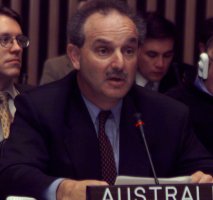 |
 Bernard Wonder, Deputy Secretary, Agriculture, Fisheries and Forestry
(Australia), gave a developed country's perspective and
agreed that poverty is the biggest impediment, which signaled a need
for economic growth, and building the capacities of land-owners.
Bernard Wonder, Deputy Secretary, Agriculture, Fisheries and Forestry
(Australia), gave a developed country's perspective and
agreed that poverty is the biggest impediment, which signaled a need
for economic growth, and building the capacities of land-owners. |
 |
Paul
Clements-Hunt, International Chamber of Commerce (left)
Martin
Khor, Third World Network (right)
|
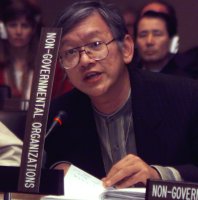 |
| Regarding
the issue of subsidies, Industry representatives supported:
the reduction of subsidies and the end of protectionism; a more cohesive
international framework for trade and sustainable development; and
a clear dispute system regarding issues arising at the WTO and in
the multilateral environmental agreements. NGOs called for
an in-depth evaluation of the impact of trade liberalization and a
moratorium on WTO negotiations in the interim. Trade Union
representatives supported: differentiated subsidies; a review of trade
and investment rules to protect the rights of workers, small farmers
and consumers; a determination by delegations at CSD-8 to incorporate
sustainable development practices, including core labour standards,
into trade agreements and guidelines at the IMF and the World Bank;
and an open process for public debate during trade negotiations to
ensure participation before agreements are imposed unjustly on workers,
consumers and farmers. Farmers' representatives underlined
the need to distinguish between trade distorting and non-trade distorting
subsidies, and outlined the need for different levels of government
involvement in policies to address the impacts of trade on agriculture,
ecology and society. |

 ENB
Summary of Ad Hoc Open-Ended Intergovernmental Group of Experts on Energy
and Sustainable Development ENB
Summary of Ad Hoc Open-Ended Intergovernmental Group of Experts on Energy
and Sustainable Development
 CSD-8
Intersessionals CSD-8
Intersessionals
 Linkages
CSD page Linkages
CSD page
 UN
- CSD website with official
documents UN
- CSD website with official
documents
 ENB's
"Introduction to CSD" ENB's
"Introduction to CSD"

|


